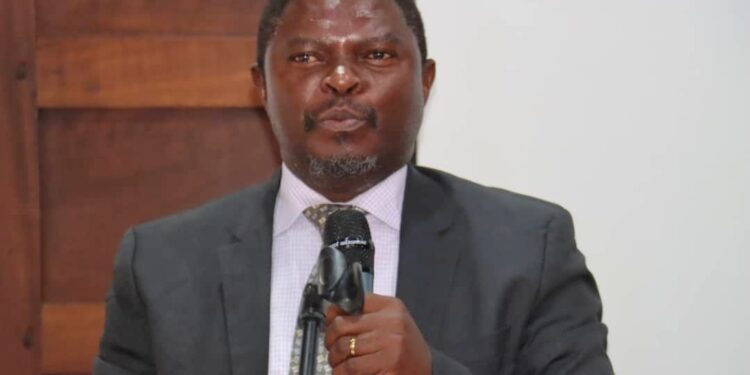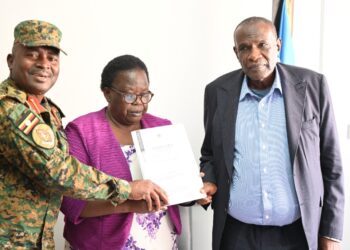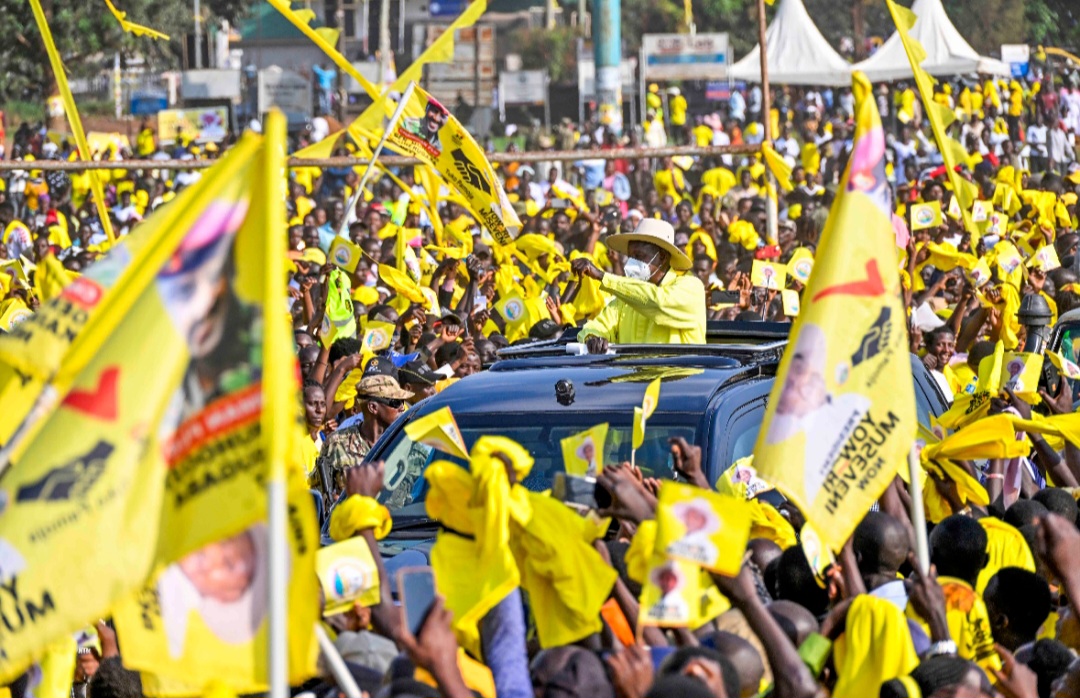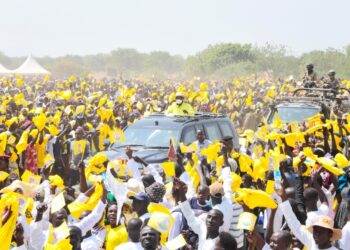The Minister for Presidency, Hon. Babirye Milly Babalanda has urged the Resident District Commissioners (RDCs) in Karamoja to intensify mobilization ahead of the 2026 general elections.
She said they are supposed to do this by citing the National Resistance Movement (NRM) Manifesto commitments achieved so far in the sub-region.
“However, I take the opportunity to advise you to desist from involving yourselves in the divisive politics in the region. The political season is now on, with several people wanting to stand in the positions of Member of Parliament and others. You are unifiers and mobilizers. You should not be seen to divide up the population especially on grounds of politics, religion or even culture,” she said.
The Minister made the remarks today in her speech delivered by the Senior Presidential Advisor on Research, Dr. Dan Ssekiboobo during the closure of a 3-day capacity building workshop for RDCs, Deputy RDCs, Assistant RDCs, DISOS and RISO in Karamoja subregion held at Mt.Moroto Hotel, Moroto Municipality.
Nonetheless, Hon. Babalanda took an opportunity to thank the RDCs for supervising and providing security to the ongoing NRM Internal Elections in their areas of jurisdiction.
“Your role here is crucial to ensure that the enemies of peace do not sabotage these processes and that we obtain popular and credible leaders that will represent the party in the general elections,” she said.
“I urge you to pick lessons of bottlenecks, inconsistencies, system failures and the host of irregularities that you can observe which can inform the upcoming elections next year and so that we have smooth elections.”
Hon. Babalanda also cautioned the RDCs against misuse of their office and mandate.
“RDCs are supervised and they get orders from H.E the President, the Minister for the Presidency, the Secretary, Office of the President and the Head, RDC Secretariat,” she noted.
“I thank those of you who are listening to our advice and instructions and have completely adjusted your working environments to allow for accountable decision making, good team work and cordial relationships. We are already seeing the fruits of this.”
On the matter of corruption, Hon. Babalanda called upon the participants to continue fighting hard to eliminate these instances in their respective districts.
“As the Office of the President, we are champions of a corrupt-free country. We do not work with corrupt staff. If you are caught red-handed, no one will defend you. You will be individually subjected to the full course of the law just like any other Ugandan,” the Minister warned.
“I invite you to learn from the fountain of honor; His Excellency the President who constantly makes reference to the Constitution in every action and decision he takes. Yet as President you would assume he would act the other way, like those he succeeded. You must follow the law and be guided by it.”
Hon. Babalanda further tasked the RDCs to take advantage of the media to mobilise Ugandans.
“It is noted that there are few of you who actually use the media to mobilize the people in this subregion yet it is a very powerful tool at your disposal,” she stated.
“You should not keep silent when our people are denied services from the government. You have the information the people need to learn of how their government is intervening in their situations. Please share this information as widely as possible.”
Additionally, Hon. Babalanda expressed concern over the recently released data on poverty levels in Uganda by the Uganda Bureau of Statistics which show poverty levels in Karamoja shooting up sharply instead of declining like in many other parts of the country.
“This is a serious finding that calls for the leaders and technical officers in the region to immediately rise up and determine the causes and solutions to the matter. Household wealth creation is currently a personal project of the President and we cannot look on as the office of the President when a whole region plummets into abject poverty,” she said.
“I therefore direct the RDCs in the region under guidance of the Regional Commissioner and the Senior Presidential Advisor – Research to understand the reasons for the escalations in poverty levels and what strategies must be advanced to address the problem.”
Hon. Babalanda also reiterated why President Yoweri Kaguta Museveni appointed two Assistant RDCs in each office of the RDC.
“The new staff are largely charged with general mobilization and promotion of patriotism. Please mentor them and enable them to undertake these roles alongside the others in the office. The assistants should concentrate largely on mobilization matters as we head towards 2026. Remember, this is a democratic government and we depend on people’s votes. When we lose power on the account of this, you also automatically lose your job.”
On the other hand, the Minister rallied the RDCs to multiply efforts in securing the region especially the borderlines, in dealing with the problems of cattle rustling, charcoal burning, laziness and drunkenness of the people, in mobilizing the people towards government programs especially the PDM, among others.
“You are also challenged to multiply monitoring efforts by working closely with the district and municipal authorities to understand how and where the public resources are being applied. We need, going forward; to emphasize the issue of impact of public investments and to capture especially the voices of the people on this,” he said.
“As I underlined it in the other regions; I need to confirm here again that the fountain of honor, H.E. the President of the Republic of Uganda will stand in the coming General Elections. I therefore ask that you continue doing your work of auditing, monitoring and supervising government programs bearing this in mind.”
Earlier on, the Commander of the Uganda People’s Defence Forces (UPDF) 3rd Division, Brig Gen. Wilberforce Sserunkuma commended the Resident District Commissioners (RDCs) and DISOs in Karamoja for their concerted efforts in pacifying the sub region.
According to Gen. Sserunkuma, RDCs with several security agencies have been able to fight criminality such as cattle rustling in the sub-region.
“We always sit and resolve the problems affecting our region. They have been able to fight cattle rustling, they are always running up and down to solve the problems in the region,” he said.
However, Brig. Gen. Sserunkuma urged the RDCs not to relent ahead of the busy political season.
“As chief mobilizers we need to check ourselves as we head to the political season. We should ask ourselves are we maintaining the last election results or we need to intensify our mobilisation for better results?”he inquired.
“Let us plan and prepare early. If we prepare early even our results will be better.”
Mr. Marvin Ssenkungu, an economist at the Manifesto Implementation Unit- Office of the President took the participants through the 2021-2026 Manifesto Review Findings revealed that the government has been able to effectively achieve 281 commitments (35 percent), ongoing commitments are 395 (49 percent) and those yet to he implemented are 133 (16 percent).
“Presently, the annual headline inflation is at 3.3 percent, a significant decrease from 8.0 percent in 2022/2023. The central bank rate is at 10.25 percent by June, 2024,” he said.
When it comes to Karamoja subregion, Mr. Ssenkungu noted that a number of frontline service delivery sectors like education and health are still below the required average, attributing it as a likely cause of the increasing poverty levels in the area.
“The region possesses potential in minerals that can be an avenue to spar industrialization and reverse the trend,” he said.
“Various local governments have to initiate discussions on possible strategies to improve the situation in the sub-region.”
Dr. Harry Mwebesa, the CEO of Reconciliation Trust International underscored the crucial role of Alternative Dispute Resolution (ADR) in solving disputes effectively.
He said H.E the President has always emphasized that Ugandans should go an African way in resolving conflicts and that’s through the Alternative Dispute Resolution.
“10 percent of the disputes go to court, the rest go elsewhere and unfortunately, they are resolved badly because most leaders don’t have that professional skill to handle the disputes,” he said.
“Engage yourself, study and internalize this skill since 70 percent of your time is spent in solving disputes.”
Dr. Mwebesa urged that as leaders, they must refine their skills to resolve disputes.
“A peace-maker RDC is the dream RDC for everyone. Your points are to identify disputes that require to be resolved immediately. Build the capacity of the elders and other stakeholders in your areas so that ADR makes a very big difference,” he noted.
Dr. Fred Makolas, the National Coordinator at Reconciliation Trust International reiterated that the RDCs should focus on promoting resolutions and resolving conflicts.
“Uganda has over 78,000 backlog cases that are yet to be solved in the past two years and ADR is the solution to this,” he urged.
He also highlighted some of the applicable ADR mechanisms such as mediation, negotiations, conciliation and reunion, co-existence and compromise as well as neutral fact finding and evaluation.
Dr. Makolas further revealed that ADR is cost effective, time efficient, flexible and it reduces conflicts.
“However it still has some challenges like limited awareness, quality and training, complexity and technical issues, power imbalance as well as cultural issues.”
Do you have a story in your community or an opinion to share with us: Email us at editorial@watchdoguganda.com













